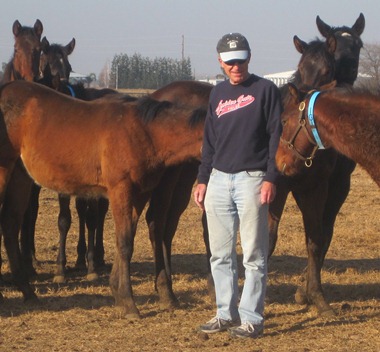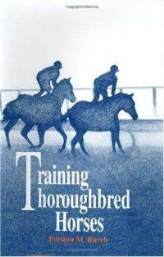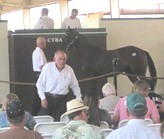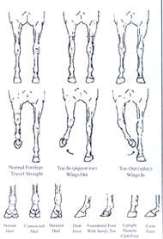Ownership
The key to both success and enjoyment as an owner is to
learn as much as possible about the sport and be involved. Yes, it is a sport and entertaining, but, like anything, it's best to treat ownership as a business to make the most of it. The challenge comes from the complexity of "the business." Even if you rely on experts for selecting, training and managing your horses and also for financial reporting, you need to know
enough to pick the right experts for you.
Organizations
/ Websites
Personal Situation and Objectives
Public Partnership vs. Co-ownership
Partners - Partners - Partners
Trainer Selection
Horse Acquisition Alternatives and Selection
Key Financial Considerations
Personal Situation and Objectives
Public Partnership vs. Co-ownership
Partners - Partners - Partners
Trainer Selection
Horse Acquisition Alternatives and Selection
Key Financial Considerations
Organizations / Websites
Where to start:
Thoroughbred Owners of California (TOC)
staff generally available at the racetracks to answer questions
ask for the book "New Thoroughbred Owners Handbook"
download their toolbar for easy access to many sites
Thoroughbred Owners and Breeders (TOBA)
owner education
owner seminars and clinics
Cal Racing
general ownership considerations
specific California racing information
live video and replays of the CA races
National ownership site - Ownerview
general ownership considerations
historical results of many public partnerships (syndications)
trainer listings, state licensing
Other organizations of note:
California Horse Racing Board (CHRB)
governing body for California racing
access to the law and rules, licensing, administrative reports
The Jockey Club
National Horsemen's Benevolent & Protective Association (NHBPA)
provides access to liability insurance
information on medication and other issues
California Thoroughbred Breeders Association (CTBA)
American Horse Council
general equine legislation, tax, welfare, economic issues
Personal Situation and Objectives
Most importantly, you do need to have some money you can afford to lose in case you're not successful to start. But from there, anything is possible. With limited resources, especially, you can try different alternatives as you learn more about racing. Then you can decide whether it's something for you or not and change your plans and objectives as you get more involved. With more experience, your investment decision making will improve. Treat racing as a business with a business plan, but modify your plan as you learn.
 Although not essential, I
believe the more involved you are, the more rewarding it will be for
you. I knew nothing about horses - I now appreciate and understand what
wonderful animals they are through reading, learning from others and
visiting the barn and farm on a regular basis. Slowly, I'm learning how
to evaluate a potential purchase and what's required to prepare a horse
for racing. I also keep up with the current issues and the politics
involved in trying to resolve them either through the Internet or by
attending meetings when possible. I find the CHRB Board Meetings and
Committee Meetings, as well as the TOC Annual Meetings and
informational presentations, interesting and valuable for understanding
the business.
Although not essential, I
believe the more involved you are, the more rewarding it will be for
you. I knew nothing about horses - I now appreciate and understand what
wonderful animals they are through reading, learning from others and
visiting the barn and farm on a regular basis. Slowly, I'm learning how
to evaluate a potential purchase and what's required to prepare a horse
for racing. I also keep up with the current issues and the politics
involved in trying to resolve them either through the Internet or by
attending meetings when possible. I find the CHRB Board Meetings and
Committee Meetings, as well as the TOC Annual Meetings and
informational presentations, interesting and valuable for understanding
the business.Get involved!
It
will really add to the enjoyment
Public Partnership vs. Co-ownership
Once you've decided to give racing a try, the next decision is whether to participate through a public partnership (often referred to as a syndication) with limited liability or through direct ownership as either an individual or with other co-owners. There are many advantages and disadvantages to either one. You can get information on public partnerships from any of the companies offering them to investors. West Point Thoroughbreds, Inc., one of the best known, has some good information sheets available to prospective investors discussing the key considerations. My focus here is on direct ownership. I'm partial to direct ownership because I want to participate in the decision making, enjoy the tax benefits, avoid the public partnership fees charged for managing the partnership and be able to enjoy going to the races in California with my partners and friends to watch my horses.
Partners - Partners - Partners
Especially when just starting out through direct ownership, finding partners is important for at least three reasons. [When I say "partners," I'm using the generic term for "co-owners."] Shared financial responsibility and risk diversification - Similar to the stock market in which an investor diversifies to avoid the downside risk of particular assets, owning multiple horses provides a better opportunity to hit a home run, or maybe grand slam, with a particular horse that can more than offset the more likely strike-outs or losses of individual horses. Owning multiple horses also means more racing excitement. Owning and racing is expensive even with just one horse; multiple horses are more affordable with partners.
Increased enjoyment from the camaraderie and shared excitement of racing - Having friends join you on visits to the barn and to watch the races is great, but having the feeling of close relationship and trust among a group of people with the same goals and risks is even better.
Increased learning opportunities - With a co-ownership group, there are opportunities to learn the business more quickly through discussions with others who have different expertise, experience and views.
 But it is not easy
to find
partners. And just any partners will not work. It's important to find
partners who are financially responsible, share the same views as you
on racing and are people with whom you want to spend time. You may need
to sacrifice one of the latter two ideals, but it is worth the extra
effort to find good partners. One possibility is to ask a trainer to
try to set you up with other partners, which can work out okay as a way
to start.
But it is not easy
to find
partners. And just any partners will not work. It's important to find
partners who are financially responsible, share the same views as you
on racing and are people with whom you want to spend time. You may need
to sacrifice one of the latter two ideals, but it is worth the extra
effort to find good partners. One possibility is to ask a trainer to
try to set you up with other partners, which can work out okay as a way
to start.
Trainer Selection
Having a good trainer is important. The trainer will identify horses for you to consider buying, be a partner with you on many horses and, of course, be responsible for training and caring for your horse. But finding the right trainer can be another challenge. You start by trying to learn as much as you can about individual trainers by asking questions of both them and others. This is discussed in the ownership information resources.
 There are many good trainers. Every trainer
professes to know the
best way to train. In most cases, it's the way he / she learned and has
used
ever since. From an owner's perspective, the methods seem quite similar
and
seem to produce similar results, with the quality and quantity of the
trainer's
stable and his aggressiveness in claiming and race selection
determining the
trainer's relative success. So what's most important is
to find one you
are comfortable with, who will keep you informed and from whom you can
learn.
If it's not right, you switch. You're not tied to one trainer nor do
you need
to have just one exclusively, although that is generally the case.
There are many good trainers. Every trainer
professes to know the
best way to train. In most cases, it's the way he / she learned and has
used
ever since. From an owner's perspective, the methods seem quite similar
and
seem to produce similar results, with the quality and quantity of the
trainer's
stable and his aggressiveness in claiming and race selection
determining the
trainer's relative success. So what's most important is
to find one you
are comfortable with, who will keep you informed and from whom you can
learn.
If it's not right, you switch. You're not tied to one trainer nor do
you need
to have just one exclusively, although that is generally the case.Find a CA trainer: CA Trainer Directory Most are also reluctant to try alternative techniques. As you gain experience, it is important to have a trainer who will listen to your ideas about what you would like and be open to trying new methods. With knowledge of alternative training methods, say to train two-year olds or maybe to treat bucked shins, topics about which much has been written, you can ask why your trainer prefers a particular approach. Hopefully, it is dependent upon the particular horse with good scientific / medical reasoning and prior success to support it. If not, you have to question the trainer's credentials.
Horse Acquisition Alternatives and Selection
 Your stable of horses will be acquired through
breeding, purchasing privately, purchasing at an auction or claiming.
Much has been written about these alternatives with an extensive
discussion of the advantages and disadvantages of each alternative.
Learn as much as you can. Knowledge and experience of all the
alternatives will be valuable for taking advantage of particular
opportunities as they arise over time. Even if an expert is proposing
and making the acquisition, you'll need to assess the expert's
knowledge of this particular situation and the possibility of this
horse being your "big horse" if the expert is correct.
Your stable of horses will be acquired through
breeding, purchasing privately, purchasing at an auction or claiming.
Much has been written about these alternatives with an extensive
discussion of the advantages and disadvantages of each alternative.
Learn as much as you can. Knowledge and experience of all the
alternatives will be valuable for taking advantage of particular
opportunities as they arise over time. Even if an expert is proposing
and making the acquisition, you'll need to assess the expert's
knowledge of this particular situation and the possibility of this
horse being your "big horse" if the expert is correct.
To know how much to pay, you need to assess the horse's racing ability and value - another very interesting and challenging subject of Thoroughbred racing. You must rely on the experts, who most likely would be your trainer, but could be a bloodstock agent or breeder. Even very knowledgeable horse people will look to experts when acquiring high-level, expensive horses. They have studied and gained experience over many years on how to evaluate the pedigree, conformation, running movement, and past performances of individual horses. As you gain knowledge and experience in these areas, you will be better prepared to judge the expert's analysis and risk you are taking.
Key Financial Decisions
Economics - In addition to the cost to purchase the horse, there are monthly fixed costs for a horse in training at the track. In Northern California it is approximately $2500. Also, when a horse races, there are fixed costs of about $400 and variable costs depending on how well it does. To cover these expenses, the horses must be running regularly at a claiming level of at least $12,500 to $16,000 (purse of $14,200 to $18,400), with a good chance of winning, which means they could be claimed. In Southern California the costs are higher and so are the purses. (In addition, any injuries could mean significant vet costs and time to recover with no chance for income.) The key is to find good horses that will race for larger purses. Ideally, it would be at the allowance level with no possibility of it being claimed. California bred horses are particularly attractive because they are eligible for special races and incentive bonuses.
Liability protection - Although I'm not aware of any situation in which a race horse owner was liable for an accident while the horse was in the care of the trainer, a transport company or an independent farm where it was being boarded, I feel it is prudent to have liability insurance. The National Horsemen's Benevolent & Protective Association offers an inexpensive policy. A personal (not for the co-ownership group) Limited Liability Corporation would provide another layer of protection for a relatively small amount without otherwise affecting the tax reporting. Legal form and tax reporting - With a number of different alternatives for the legal form of the ownership group and also a number of alternatives for how an individual organizes his racing business, the tax reporting can be complicated, but also very flexible to provide what is best for each owner's individual tax situation. Review the various resources, talk to your tax preparer and ask other owners how their business is structured. Depending on what you select, be sure to understand what is required to meet the provisions of the pertinent tax law.
